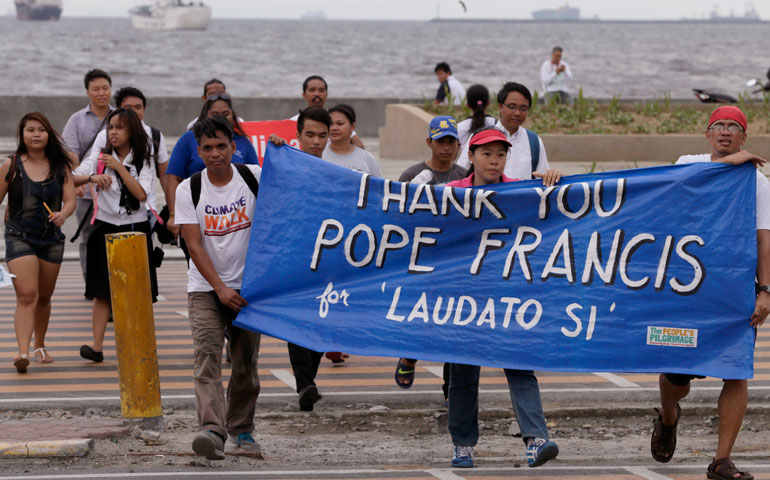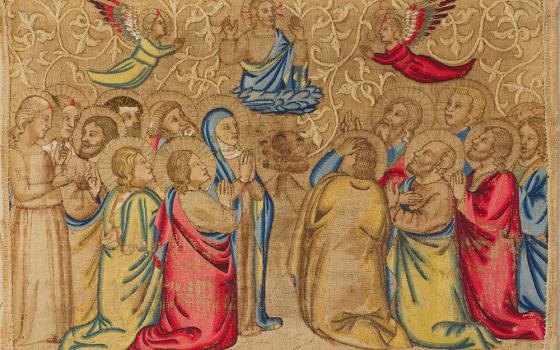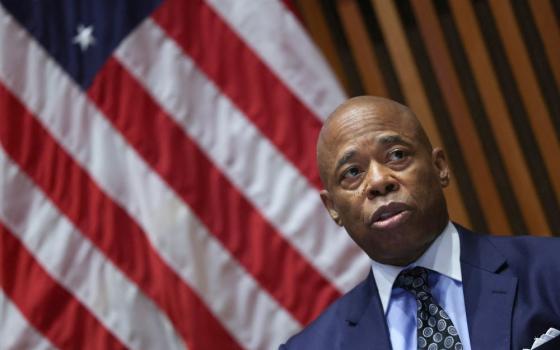
Environmental activists march toward a Roman Catholic church to celebrate the release of Laudato Si', Pope Francis' encyclical on the environment, June 18, 2015, in Manila, Philippines. (AP Photo/Bullit Marquez)
Last year's arrival of Pope Francis' encyclical "Laudato Si', on Care for Our Common Home" marked a significant moment as the Catholic church substantially entered the realm of environmental concern at a time when global attention toward the Earth's degradation, in particular by climate change, was nearing a peak.
Since then, signs of the encyclical's impact have already appeared. Many parishes, schools and communities have studied, reflected and discussed the text, often through multidisciplinary conferences and much as Francis requested in its introduction: "I would like to enter into dialogue with all people about our common home."
More ambitious corners began taking first-step actions at institutional levels by forming green teams, improving energy efficiency and reducing wasteful consumption. For those long engaged in environmental issues, the encyclical proved a valuable rallying tool, one that opened doors, spurred mobilization and generated not-seen-before excitement within Catholic circles.
"I cannot wish for anything better," said Cardinal Peter Turkson, president of the Pontifical Council for Peace and Justice, which oversaw the first draft of the encyclical. Since its publication last June 18, Turkson has served as its chief promoter, traveling across the globe to deliver countless talks on Laudato Si'.
"I think it has proven to be really transformative," said Tomás Insua, co-founder of the Global Catholic Climate Movement. "But there's definitely a long way to go to really get this encyclical to really sync in our Catholic identity and really drive transformational change."
Out of the gate
While few anticipated the encyclical would yield immediate, far-reaching changes, it produced some out-of-the-gate impacts. For one, Francis placed environmental concern on the Catholic calendar by designating Sept. 1 as the annual World Day of Prayer for the Care of Creation.
Within nations, Turkson pointed to several African countries that have organized around the encyclical to move away from fossil fuels and forests as energy sources and adopt solar technology.
The Philippines church -- residing in one of the most climate vulnerable regions and long active in environmental issues -- organized rallies, petition drives and prayer services around the encyclical. As part of global "Break Free from Fossil Fuels" events in May, Lipa Archbishop Ramon Arguelles led a 10,000-person march against new coal-fired power plants.
Last year, the Federation of Asian Bishops' Conferences established a climate desk. In Brazil, bishops are planning a " Laudato Si' road show" for later this summer.
More: "Laudato Si' Week renews awareness ahead of encyclical anniversary" (June 14, 2016)
As positive efforts proceeded, so too did the realization of the degradation Francis described, said Joan Rosenhauer, executive vice president of U.S. operations for Catholic Relief Services. Recent trips that Rosenhauer took to the Philippines, where storms have worsened in the central islands, and Nicaragua, where warmer temperatures have disrupted growing seasons, showed how people are dealing with already-present effects of climate change.
"They're going to have to live their lives differently," she said.
In the U.S., numerous dioceses have undertaken their own encyclical implementation efforts. In Atlanta and San Francisco, they've formed preparatory plans. More concrete steps are underway in Chicago, where the archdiocese is pushing energy efficiency in its buildings, and San Diego, which has encouraged all parishes to install solar-power systems.
"Things are just popping up all over the place," said Dan Misleh, executive director of the Catholic Climate Covenant.
A Yale/George Mason survey at the encyclical's six-month mark found one in three Catholics acknowledging a papal influence on their views of global warming. A quarter of them were aware of Laudato Si', and there were increases of 11 percentage points and 20 percentages points in becoming worried about global warming (64 percent) and believing it will harm the poor (62 percent), respectively.
A survey released Monday from the Center for Applied Research in the Apostolate at Georgetown University also found a third of Catholics having heard of or read the encyclical -- a percentage that has roughly held steady since July 2015. On the flipside, the CARA survey found 56 percent of those polled were not aware of the document. Still, six-in-10 Catholics agreed that climate change was occurring and largely a result of human activity. Additionally, 68 percent of Catholics (63 percent of U.S. adults) recognized a personal moral responsibility to address climate change, with 32 percent of Catholics saying the pope strengthened that belief; 68 percent reported no papal influence on their moral views regarding the climate.
On the international scene, maybe the encyclical's greatest impact came at the Paris climate negotiations in December. There, Laudato Si' "played a key role," said Turkson, a member of the Vatican delegation at COP 21, the United Nations climate change conference. The Vatican received credit, along with other faith groups and island nations, for its endorsement of the Paris Agreement attaching a 1.5 degrees Celsius target to its central 2-degrees (3.6 degrees Fahrenheit) commitment to limit average global temperature rise.
Mobilizing Catholics
Beyond Holy See intervention, the encyclical helped mobilize 900,000 Catholics to sign the Catholic Climate Petition (which included the 1.5 degrees target) and 40,000 Catholics to join Global Climate March rallies ahead of the Paris summit. Amid both those efforts was the Global Catholic Climate Movement, itself an anticipatory response to Laudato Si' in its formation ahead of Francis' January 2015 visit to the Philippines.
The network, which began with 19 member organizations and now counts 300-plus, organized and delivered the Catholic Climate Petition to key leaders at the Paris climate talks.
The COP 21 mobilization "would have been absolutely impossible without the encyclical," Insua said.
The type of cooperation demonstrated in the Global Climate March, with religious and secular groups joining as a single force, can be attributed in some part to the encyclical, said Lorna Gold, head of policy and advocacy for Trócaire, the Irish Catholic development agency.
Gold, who has 14 years in policy advocacy, said the encyclical has given "a real boost" to the climate movement both within and outside the church, especially in uniting fronts along shared interests.
"You can see a convergence between the more secular actors and the faith-based actors on a number of big issues in the encyclical," she said.
That convergence marks a stark change from past interactions, where Gold described Catholic agencies more left "out in the cold" on broader discussions of human rights and environmental issues. The encyclical has changed that, she said, with Catholic groups experiencing a "sea change" in the role they play in civil society, where they now act as quasi-gatekeepers for Francis, viewed as one of the most influential leaders on global environmental issues.
While the agenda of a more sustainable global society has existed for years, it's becoming clear, Gold said, that the necessary transformative changes in policy, lifestyle and consciousness cannot happen without greater collaboration among individual initiatives.
"What Laudato Si' has done has made us look at, well, first the urgency and the depth of the challenge that we're facing, but also to think that we won't be able to do this unless we do it together," she said.
More: "Irish conference hears message: Climate action requires 'new era of solidarity'" (June 30, 2015)
Gold added that the pope "has really thrown open the agenda. ... It's almost like he said the unsayable," and broadened the accessible public policy discussion for Catholic agencies.
One door he's opened wider is the issue of fossil fuel divestment. A favorite citation of activists has been Paragraph 165, where Francis states the need to move away from "highly polluting fossil fuels ... without delay."
Those types of divestment ideas weren't being discussed much in the mainstream pre-encyclical, Gold said. Trócaire has committed to divesting their stock pension plans from fossil fuels in the next two years and is engaging Irish dioceses and universities in the divestment conversation.
On Thursday, four Pacific-area religious orders announced they will divest from coal, oil and gas companies. According to Global Catholic Climate Movement, the decision was the first-ever joint Catholic divestment announcement. The divesting orders are the Marist Sisters Australia, Presentation Congregation Queensland, Presentation Sisters Wagga Wagga, and the Passionists of the Holy Spirit Province Australia, New Zealand, Papua New Zealand and Vietnam.
"This is a key part of the way we engage in God’s mission, especially at a time when the challenge to address global warming is so urgent," said Presentation Sr. Marlette Black, congregation leader of the Queensland Presentation sisters, in a statement.
The joint divestment announcement was a result of a working group recently formed by Global Catholic Climate Movement. Insua said as that group develops and organizes, he anticipates more Catholic orders and institutes will follow suit in divesting in the next two years, beginning with another expected joint pledge in October near the Feast of St. Francis (Oct. 4).
More: "Dayton divestment conference delves into ways to leave fossil fuels behind" (Nov. 12, 2015)
Turkson told NCR he has heard the conversations around divestment pick up among religious orders, but so far, those haven't developed similarly in the Holy See.
"There's not yet been any policy from the Vatican against any such investment," he said.
While Francis urges a shift from fossil fuels, Turkson recognized the message comes off as corrosive in regions highly reliant on coal mining, such as Poznan, Poland, which he visited in November. The pope's intent, Turkson said, is "a gradual weaning" as alternatives develop, and not one that leaves masses of people instantly without wages or work.
The people lead
Despite noticeable progress, those engaged in environmental issues say there's still much to do in terms of bringing the encyclical to life. While many bishops wrote or spoke about the encyclical in the days and weeks after its release (Catholic Climate Covenant counted nearly 100 in the U.S. in the first month), Insua said only a few bishops' conferences have really raised the environment to central issue status.
That means not only writing statements, he said, but engaging in advocacy, specifically "for bold climate action." He predicted that step would only come if the people lead their prelates toward it.
"I think that the bishops of many countries will follow when they see that the Catholic grassroots are taking action by themselves," Insua said.
Gold senses "a nervousness" among the Irish hierarchy and clergy, who may feel out of their element on environmental issues. She and others have suggested a synodal process on the environment as one channel to more immerse Laudato Si' into the heart of the church, or including those discussions as part of the rumored synod on peace.
Misleh of Catholic Climate Covenant said he was pleased by the work he saw at the U.S. Conference of Catholic Bishops, which produced prayer and study guide resources for the encyclical, in addition to continued advocacy on Capitol Hill for full U.S. funding of the Green Climate Fund and national carbon standards on coal-fired power plants via the Clean Power Plan.
"Nobody can say that their resources haven't expanded exponentially in this area," he said.
At the same time, Misleh also acknowledged one of the biggest challenges is developing a greater comfort with the encyclical among clergy and lay leaders.
To that end, the Catholic Climate Covenant is developing a pastoral training program to help pastors become more comfortable discussing the encyclical and the theology behind caring for creation and addressing environmental issues. A similar effort is underway between Trócaire and the Irish bishops' conference.
In addition, the Global Catholic Climate Movement plans to expand its Laudato Si' animator program from the 500 people in 60 countries it's trained to mobilize local advocacy efforts. Likewise, Catholic Climate Covenant hopes to grow its ambassador network of encyclical speakers and is working on separate programs reaching out to Latino communities and church facilities managers.
As far as the long-term impact, Turkson placed Laudato Si' into the larger compendium of social encyclicals, describing them together "like a big river," with new tributaries forming as it flows forward. Like past encyclicals, such as Rerum Novarum, it too will stimulate future teachings and ideas, he said.
"But it is forever going to inspire the church's teaching on ecology and integral ecology."
[Brian Roewe is an NCR staff writer. His email address is broewe@ncronline.org. Follow him on Twitter: @BrianRoewe.]
Editor's Note: Want more stories from Eco Catholic? We can send you an email alert once a week with the latest. Just go to this page and follow directions: : Email alert sign-up.







